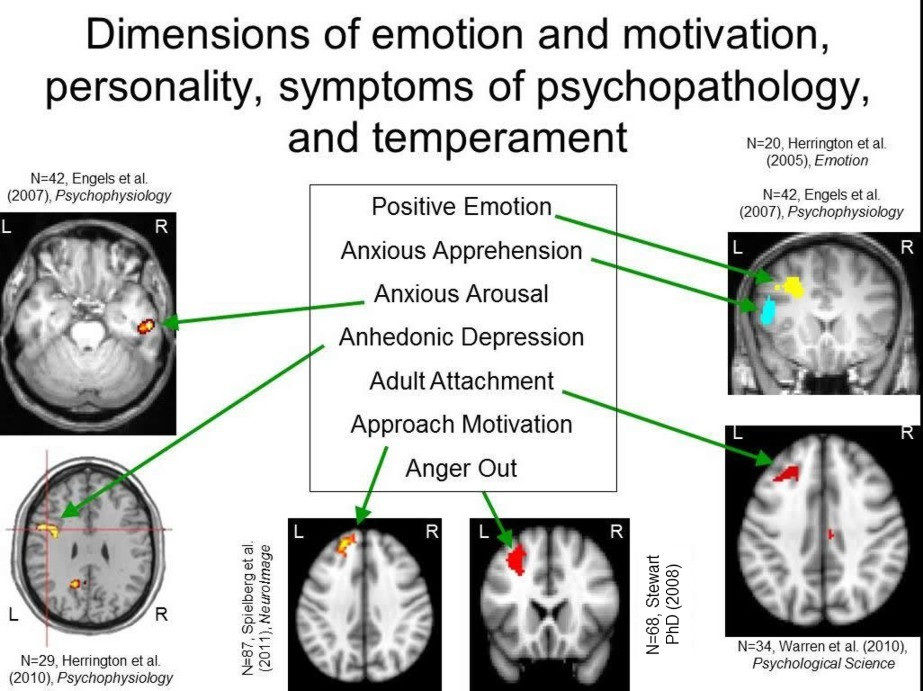Information about the CANOPY Lab.
 Neuropsychological research in the Cognitive & Affective Neuroscience of Psychopathology Lab, also known as the CANOPY and the Heller Lab, has demonstrated that not only are different regions of the brain specialized for different cognitive functions, they also differ in the role they play in emotional processing. Areas of the brain that are involved in information processing are thus, concurrently and in a complementary manner, engaged in a variety of emotional processes, which may influence or interact with cognition at various stages of the learning or memory process. The research in our lab focuses on examining how activity and function of different brain regions influence cognitive, emotional, and social functioning and the implications for psychopathology, especially mood and anxiety disorders. We combine experimental paradigms from cognitive psychology with behavioral measures such as performance on neuropsychological tasks and measures of central nervous system activity such as EEG/ERPs and fMRI.
Neuropsychological research in the Cognitive & Affective Neuroscience of Psychopathology Lab, also known as the CANOPY and the Heller Lab, has demonstrated that not only are different regions of the brain specialized for different cognitive functions, they also differ in the role they play in emotional processing. Areas of the brain that are involved in information processing are thus, concurrently and in a complementary manner, engaged in a variety of emotional processes, which may influence or interact with cognition at various stages of the learning or memory process. The research in our lab focuses on examining how activity and function of different brain regions influence cognitive, emotional, and social functioning and the implications for psychopathology, especially mood and anxiety disorders. We combine experimental paradigms from cognitive psychology with behavioral measures such as performance on neuropsychological tasks and measures of central nervous system activity such as EEG/ERPs and fMRI.
Overall, our work showcases state-of-the-art approaches that have been identified as crucial in developing a novel classification of mental disorders (see Hyman, 2007, Nature Reviews Neuroscience). We have advanced a dimensional approach in the context of a cognitive neuroscience investigation of psychopathology. Our work has contributed significantly to the effort to identify an endophenotype for depression (Bruder et al., 2007, Biological Psychiatry). Our findings are relevant not only for understanding severe mental disorders. We have observed the same patterns in nonclinical populations (e.g. college students) with mild levels of depression and anxiety. Therefore, our results help to elucidate the role of cognition/emotion interactions in risk for and vulnerability to more serious disorders of psychopathology. Our recent work has examined individual differences in personality (e.g., schizotypy), motivation (e.g., approach/avoidance temperament), attachment, and executive function and their relationship to brain function and psychopathology. Studies underway include manipulations of incentive, emotional context, and individual differences in the service of discovering brain mechanisms involved in normal cognition and emotion and especially in how they contribute to psychopathology.
Dr. Wendy Heller is the director of the CANOPY lab.
Check out our website here!
Our Research Focus
 The focus of our research has been on understanding how emotions affect the way that people think, especially when they are depressed and/or anxious. When we’re upset we tend to think less clearly, and there is a great deal of research showing that depression and anxiety interfere with optimal cognitive performance in a variety of domains (for more information, see a review paper from 2007 by Becky Levin–now Silton–former student in our lab). Most recently, we have become especially interested in executive functions and cognitive control. These domains of cognitive function seem to be especially disrupted in psychopathology. Our work has shown that depression is associated with deficits with activating the dorsolateral prefrontal cortex, a brain region involved in the ability to modulate attention in a top-down way. This may be the source of difficulties in concentration and efficient task performance in depression. In addition, we have shown that different types of anxiety interact differently with brain activity in this region, which has implications for the development of cognitive problems in depression. We have provided compelling evidence for different patterns of brain activity associated with each of two types of anxiety: anxious apprehension (verbal rumination, worry) and anxious arousal (intense, immediate fear and/or panic). The nature of cognitive processing in mood and anxiety disorders appears to depend on the degree to which these different dimensions of depression and anxiety are present.
The focus of our research has been on understanding how emotions affect the way that people think, especially when they are depressed and/or anxious. When we’re upset we tend to think less clearly, and there is a great deal of research showing that depression and anxiety interfere with optimal cognitive performance in a variety of domains (for more information, see a review paper from 2007 by Becky Levin–now Silton–former student in our lab). Most recently, we have become especially interested in executive functions and cognitive control. These domains of cognitive function seem to be especially disrupted in psychopathology. Our work has shown that depression is associated with deficits with activating the dorsolateral prefrontal cortex, a brain region involved in the ability to modulate attention in a top-down way. This may be the source of difficulties in concentration and efficient task performance in depression. In addition, we have shown that different types of anxiety interact differently with brain activity in this region, which has implications for the development of cognitive problems in depression. We have provided compelling evidence for different patterns of brain activity associated with each of two types of anxiety: anxious apprehension (verbal rumination, worry) and anxious arousal (intense, immediate fear and/or panic). The nature of cognitive processing in mood and anxiety disorders appears to depend on the degree to which these different dimensions of depression and anxiety are present.